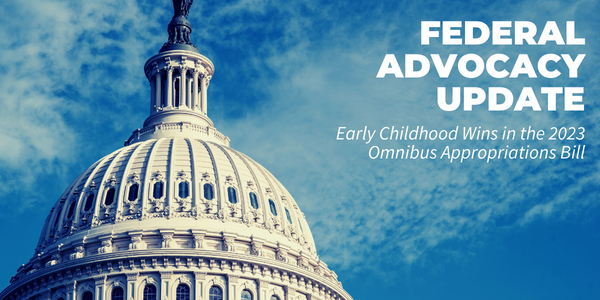Celebrating Early Childhood Wins in the 2023 Omnibus Appropriations Bill

By: GEEARS
In the final days of 2022, Congress approved a $1.7 trillion omnibus appropriations bill for Fiscal Year 2023. It was signed into law on December 29th. Within this legislation are many exciting—even historic—wins for working families with young children.
“The bipartisan approval of this new funding shows that our representatives at the federal level have been listening to the GEEARS community, who’ve answered the call of our action alerts with impassioned emails, phone calls, and in-person meetings,” says GEEARS Executive Director, Mindy Binderman. “I’m thrilled to see so much in this bill that centers the needs of families with babies and toddlers, needs that include accessible, quality early education and child care, physical and mental health care for both adults and young children, protections for pregnant and postpartum workers, and more. While our organization and our allies still have work to do to advocate for Georgia families, this legislation gives us a promising new foundation to build upon.”
We’re excited to share with you some of the key game-changers the omnibus bill contains for Georgia families.
Child Care Access
Funding for the Child Care and Development Block Grant (CCDBG) — which primarily funds child care scholarships for working families considered low income — has increased by 30%. For Georgia, this amounts to an estimated $76 million for the Childcare and Parent Services (CAPS) program. The new increase to CCDBG will help mitigate the upcoming loss of the federal relief funds.
Home Visiting
The Maternal, Infant, and Early Childhood Home Visiting program Maternal, Infant, and Early Childhood Home Visiting program (MIECHV) has been reauthorized and is on a path to double its funding to $800 million over the next five years. This will help support Georgia’s Home Visiting Programs, which connect caregivers with trained professionals who support them during the early stages of raising their families.
Health
- The omnibus bill includes $30 million in new funding to place early childhood development experts in community health centers. The bill also includes a budget increase from $5 million to $10 million to place early childhood development experts in pediatric settings.
- Infant and early childhood mental health grants have been reauthorized for the next five years, and their funding has increased by $5 million to $15 million. Maternal depression screening is also getting a funding boost.
- To support maternal and child health, state maternal innovation health grants are increasing by $26 million. Parents who use the Special Supplemental Nutrition Program for Women, Infants, and Children (WIC) will continue to have increased access to fresh produce, an extension of funding that came with federal pandemic relief funds.
- The American Rescue Plan Act temporarily (through 2027) gave states the option to extend postpartum Medicaid eligibility to twelve months (Georgia opted to extend this eligibility in 2022). That option has now been permanently afforded to states. In addition, beginning in 2024, all children enrolled in Medicaid, and the Children’s Health Insurance Program (CHIP) will now have 12-month continuous eligibility, which means they will not lose health coverage if their parents’ income fluctuates throughout the year.
Pregnant Workers Fairness Act
This landmark legislation ensures that pregnant and postpartum workers are not forced off the job and that they get the accommodations they need in the workplace without facing discrimination or retaliation.
Many other initiatives critical to young children and their families are getting funding increases, including:
- Head Start and Early Head Start: $12 billion, a $960 million increase over FY2022
- Preschool Special Education (Part B of the Individuals with Disabilities in Education Act (IDEA)): $420 million, a $10.4 million increase over FY2022
- Early Intervention (IDEA Part C): $540 million, a $43.7 million increase over FY2022
- Preschool Development Grant, Birth Through Five (PDG B-5) program: $315 million, a $25 million increase over FY2022
- Infant-Toddler Court Program, which connects court-involved families to wraparound and mental health services to prevent the removal of infants and toddlers: $18 million, a $5 million increase over FY2022